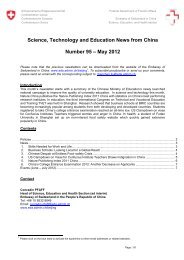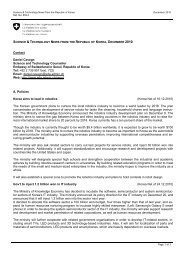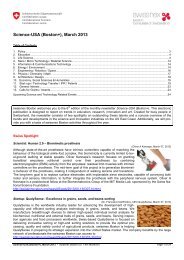Science-USA (Boston+) - swissnex Boston
Science-USA (Boston+) - swissnex Boston
Science-USA (Boston+) - swissnex Boston
Create successful ePaper yourself
Turn your PDF publications into a flip-book with our unique Google optimized e-Paper software.
Schweizerische Eidgenossenschaft<br />
Confédération suisse<br />
Confederazione Svizzera<br />
Confederaziun svizra<br />
New uniform calculation for high school graduation rates<br />
(The <strong>Boston</strong> Globe, November 26, 2012)<br />
Massachusetts failed to crack the top 10 for the best high school graduation rates in the nation and also had among<br />
the lowest rates in New England, according to data released by the US Education Department that for the first time<br />
provides a uniform calculation for graduation rates. Previously, states reported graduation rates using their own<br />
methodology to the US Department of Education – a situation that made it impossible to accurately compare rates<br />
between the states. The US Education Department is mandating that graduation rates — calculated under its<br />
methodology — become a key element of accountability systems across the nation. Paul Reville, Massachusetts<br />
secretary of education, cautioned that the federal data still does not provide a complete apples-to-apples comparison,<br />
noting that standards to earn a diploma can still vary greatly among the 50 states.<br />
http://swissinnovation.org/newsUS/web/2012/02-121126-e1.html<br />
3. Life <strong>Science</strong><br />
Multivitamins don’t prevent heart disease<br />
(The <strong>Boston</strong> Globe, November 05, 2012)<br />
A study, conducted by Brigham and Women’s Hospital, involved nearly 15,000 male physicians over age 50 who<br />
were randomly assigned to take a Centrum Silver multivitamin or a placebo for an average of 11 years. The researchers<br />
found that multivitamins offered no protection against heart attacks, strokes, or deaths from heart disease.<br />
Megadoses of individual nutrients such as vitamin E and beta carotene have previously been shown to offer<br />
no protection against heart disease, and the latest finding underscores the importance of looking elsewhere to reduce<br />
the most common cause of American deaths. Heart disease can be an inevitable part of aging but making a<br />
lifetime commitment to eating right and exercising can delay the onset of this disease.<br />
http://swissinnovation.org/newsUS/web/2012/03-121105-06.html<br />
Man climbs 102 floor skyscraper with bionic leg<br />
(The Big Story, November 05, 2012)<br />
The metal on Zac Vawter bionic leg gleamed as he climbed 103 floors of Chicago's iconic<br />
Willis Tower, becoming the first person ever to complete the task wearing a mind-controlled<br />
prosthetic limb. The robotic leg is designed to respond to electrical impulses from muscles in<br />
his hamstring. The computerized prosthetic limb, like something from a sci-fi film, weighs<br />
about 10 pounds and holds two motors. When Vawter thought about climbing the stairs, the<br />
motors, belts and chains in his leg synchronized the movements of its ankle and knee.<br />
http://swissinnovation.org/newsUS/web/2012/03-121105-48.html<br />
Diligent young researcher retracts his first publication<br />
(The <strong>Boston</strong> Globe, November 05, 2012)<br />
At 17, Nathan Georgette published his first scientific paper, in the Internet Journal of Epidemiology.<br />
While taking a course about ordinary and partial differential equations at Harvard<br />
University, where he is a senior studying applied mathematics, Georgette realized he had<br />
made a crucial mistake in his calculations in his research for the paper. The approach “was<br />
fundamentally flawed,” he said, and after contacting the editorial board of the Journal of Epidemiology,<br />
Georgette retracted the paper. Errors are part of science, but many researchers<br />
are not as diligent about setting the record straight, said the cofounder of a blog that tracks retractions of scientific<br />
papers.<br />
http://swissinnovation.org/newsUS/web/2012/03-121105-85.html<br />
Cambridge pharma and research pool attracts newcomers<br />
(The <strong>Boston</strong> Globe, November 08, 2012)<br />
Human Metabolome Technologies, a Japanese biotechnology company based in Tsuruoka, Japan, currently has<br />
50 employees in two Japanese offices. Human Metabolome is opening its first US location in Cambridge they<br />
chose Cambridge to gain access to the area’s many pharmaceutical companies and research institutions. The<br />
Kendall Square site, which includes laboratory space, has just one employee now, but the company said it expects<br />
to hire 20 by 2015.<br />
http://swissinnovation.org/newsUS/web/2012/03-121108-7b.html<br />
<strong>Science</strong>-<strong>USA</strong> (<strong><strong>Boston</strong>+</strong>), November 2012 • <strong>swissnex</strong> <strong>Boston</strong> (Dr. Felix Moesner / Sabina Tresch) Page 4 of 12






